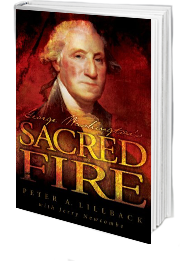We Must Rekindle Washington’s Sacred Fire Of Liberty—Before It’s Too Late
George Washington knew a lot about fire.
Indeed, Washington’s youthful diaries tell of his tent catching fire and escaping by a hair’s breadth of his life. General Washington’s great victory at Trenton on Christmas Day was followed by a stroke of genius that enabled him to take Princeton too. The ruse was to keep fires burning all night in the American camp. This kept the British troops waiting for morning. But when morning came there were only smoldering fires. The army had slipped out under the cover of darkness and took Princeton and the military stores that the British had left behind when they flew to aid the hapless Hessians at Trenton. The European powers took note of Washington’s cunning and his fame flamed high.
Washington knew that fire was dangerous and deceiving. But he also knew it represented the divine. The 110th and final rule of his Rules of Civility copied as a school boy taught, “Labor to keep alive in your Breast that Little Spark of Celestial fire Called Conscience.” These words guided his life, but never did fire burn more brightly than when he spoke as the first president under the Constitution. The hitherto fearless leader said with trembling lips, “The preservation of the sacred fire of liberty and the destiny of the republican model of government are justly considered as deeply, perhaps as finally, staked on the experiment entrusted to the hands of the American people.” The preservation of the sacred fire of liberty was an experiment in republican government entrusted to us!
But something seems to have gone wrong with the experiment. What is happening to the sacred fire that Washington fought so hard to win and then bequeathed to us?
Could it be that the problem with the sacred fire of liberty in America is that we no longer believe that it is, or know that it was meant to be, a sacred, or holy flame? Do we understand that America’s sacred fire will only burn as brightly as “that little spark of celestial fire called conscience?”
Our Founders understood that the separation of Church and State did not mean the separation of God and government. Washington reminded the nation in his Farewell Address that “religion and morality are indispensable supports of our political prosperity.” Our Founders’ logic went something like this:
- To be free, you need a republic.
- To have a republic, you need a Constitution.
- To have a Constitution, you need morality.
- To have morality, you need religion.
So what’s gone wrong? Simply put, we’ve rejected the wisdom of our Founders. We’ve attacked religion everywhere we can. And since we’ve removed religion from the public square it’s no wonder that national morality from Main Street to Wall Street to Pennsylvania Avenue is disintegrating before our very eyes. And if religion and morality are gone, what’s next? Is our Constitution at risk as well?
If you can be patient enough to read by the light of Washington’s sacred fire, you’ll find this warning regarding the future of our Constitution, intended for the first Congress:
I pretend to no unusual foresight into futurity, and therefore cannot undertake to decide, with certainty, what may be its [the Constitution’s] ultimate fate. If a promised good should terminate in an unexpected evil, it would not be a solitary example of disappointment in this mutable state of existence. If the blessings of Heaven showered thick around us should be spilled on the ground or converted to curses, through the fault of those for whom they were intended, it would not be the first instance of folly or perverseness in short-sighted mortals. The blessed Religion revealed in the word of God will remain an eternal and awful monument to prove that the best Institutions may be abused by human depravity, and that they may even, in some instances be made subservient to the vilest of purposes. Should, hereafter, those who are entrusted with the management of this government, incited by the lust of power and prompted by Supineness or venality of their Constituents, overleap the known barriers of this Constitution and violate the unalienable rights of humanity: it will only serve to show, that no compact among men (however provident in its construction and sacred in its ratification) can be pronounced everlasting and inviolable, and if I may so express myself, that no Wall of words, that no mound of parchment can be so formed as to stand against the sweeping torrent of boundless ambition on the one side, aided by the sapping current of corrupted morals on the other.”
Is this Washington’s description of the Constitutional crisis that faces America today? Perhaps Washington’s sacred fire enabled him to have “foresight into the future” after all! If religion is gone and morality is fading, and the Constitution is leaped over at will, what will become of our republic? The words of Benjamin Franklin spoken to a lady who asked him as to the kind of government they had created as he left the Constitutional Convention now has a sobering ring, “A Republic, Madam, if you can keep it.” And what then will be the fate of freedom itself?
We must rekindle the Sacred Fire of Liberty—before its flame goes out and darkness falls. But where can one start? How about beginning with Washington’s rule #110, “Labor to keep alive in your Breast that Little Spark of Celestial fire Called Conscience.” For after all, “The preservation of the sacred fire of liberty and the destiny of the republican model of government are justly considered as deeply, perhaps as finally, staked on the experiment entrusted” into your hands. So don’t curse the darkness. Instead, light a candle that can light a thousand more with George Washington’s Sacred Fire of Liberty.
Read more in George Washington’s Sacred Fire – available from our Liberty Store
